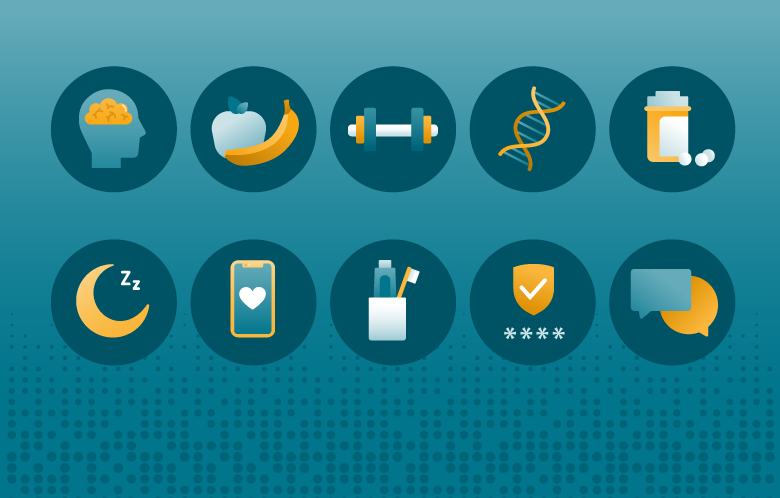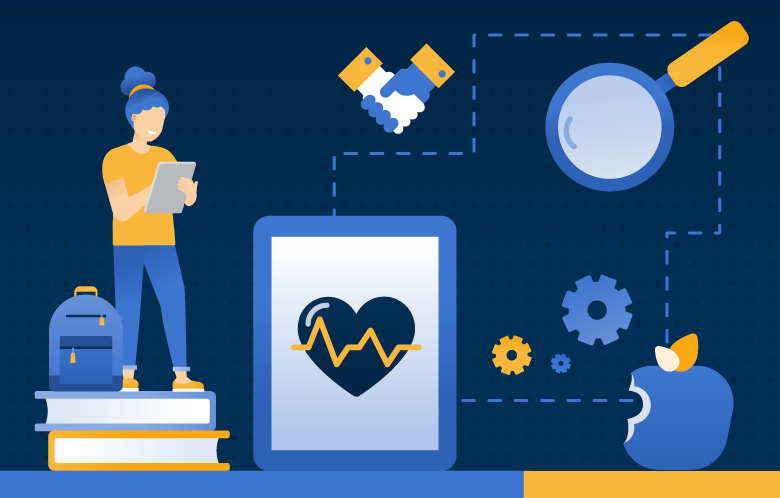Use of digital media among teens has grown faster in the past few years, and experts attribute this change to the COVID-19 pandemic. According to Common Sense Media, between 2019 and 2021, the total amount of screen media used each day among teens went from 7 hours and 22 minutes to 8 hours and 39 minutes. In the age of online influencers and widespread misinformation, helping young people develop health literacy skills is more important than ever.
High school librarians can play a vital role in increasing health literacy among students by ensuring their collections include reputable, trustworthy health information resources that support student research and classroom instruction. Since print materials on health and wellness topics quickly become out of date, school librarians should look for a digital resource that is routinely updated to ensure the most current information is available. In addition, the ideal resource will offer several content types to support learning differences and cover a variety of topics relevant to teens.
To help school librarians identify the best digital solution for health literacy education, we’ve curated a list of the top 10 health topics typically covered in high school health classes. Educators should remember to approach these topics with sensitivity and create a safe and inclusive environment for discussions.
-
Mental Health
Educate students about common mental health issues such as stress, anxiety, depression and the importance of seeking help when needed. Discuss coping strategies, stress management techniques and ways to promote positive mental health.
-
Nutrition and Healthy Eating
Help teenagers understand the importance of a balanced diet, the role of nutrients, portion control and the effects of unhealthy eating habits. Encourage them to make informed food choices and understand the impact of nutrition on their physical and mental well-being.
-
Physical Fitness
Discuss the benefits of regular physical activity and the various forms of exercise available. Teach students about the importance of staying active, maintaining a healthy weight, and building strong bones and muscles.
-
Sexual and Reproductive Health
Provide comprehensive sex education, including information about contraception, sexually transmitted infections (STIs), consent, healthy relationships, and understanding one's own sexual health and identity.
-
Substance Abuse
Educate teenagers about the risks associated with drug and alcohol use, including the short-term and long-term consequences. Discuss strategies for resisting peer pressure and making responsible choices.
-
Sleep Hygiene
Highlight the importance of a good night's sleep and the potential consequences of sleep deprivation. Provide information on establishing healthy sleep habits, managing screen time, and creating a conducive sleep environment.
-
Body Image and Self-Esteem
Foster discussions about body image issues, media influence, and societal pressures. Help students develop a positive self-image, understand the importance of self-acceptance, and promote healthy self-esteem.
-
Personal Hygiene
Discuss the significance of maintaining personal hygiene, including proper handwashing, dental care, skincare and grooming practices. Emphasize the importance of cleanliness in preventing illness and promoting overall well-being.
-
Internet Safety and Cyberbullying
Teach teenagers about online safety, privacy, responsible social media use, and strategies to protect themselves from cyberbullying and online harassment. Discuss the potential consequences of inappropriate online behavior.
-
Healthy Relationships
Provide information on healthy communication, consent, boundaries, recognizing and addressing abusive behaviors, and building positive relationships with peers, family and romantic partners.
By providing students and teachers with access to vetted health information resources, school librarians not only support school health curriculum, but also empower students to make informed decisions regarding their physical and mental well-being.
Consumer Health Ultimate is a comprehensive database from EBSCO that includes full-text articles from reputable journals and magazines, evidence-based health reports, reference e-books, medical images and diagrams, animations with audio narration and transcripts, health pamphlets from government agencies, drug information in both English and Spanish, and a medical dictionary.



